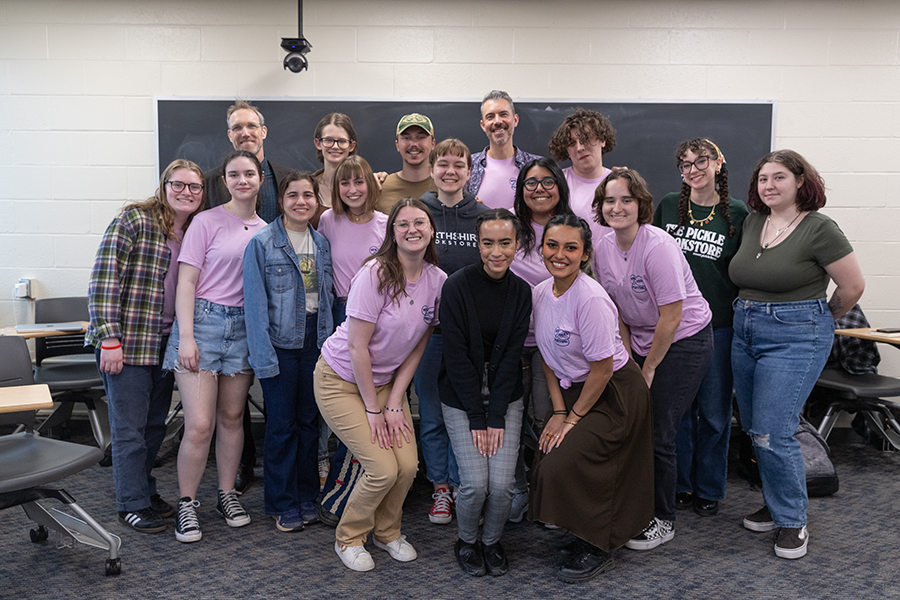“Men, Women & Children” opens with a beautiful scene of the cosmos, accompanied by Emma Thompson’s eloquent narration, reminding viewers that Earth is nothing more than a pale blue dot. Enter that pale blue dot, however, and viewers are drawn into the intertwining lives of dysfunctional families, much of this dysfunction stemming from the Internet. The film follows the lives of these families as they struggle to navigate their relationships with one another and with the virtual online world they often choose to live in.
The cast is star studded, with Adam Sandler in a surprisingly serious role as Don Truby, an estranged spouse; Judy Greer as Donna Clint, the stage mother; and Jennifer Garner as Patricia Beltmeyer, the most tech-savvy, ultra-protective mom that any generation has ever seen. Patricia and Donna serve as polar opposites: While Patricia attempts to shield her daughter from the horrors of the World Wide Web, her counterpart Donna encourages her daughter to use it to her advantage and, ultimately, her exploitation. Both situations reinforce the idea that the Internet is not to be feared, but also not to be taken advantage of.
The complication among the adults and children are often extreme and worst-case scenarios, though are essential for the shock-factor of the film. The plot moves quickly and purposefully, living up to its R-rating with sexual and often hard-to-watch scenes. While this may turn off younger audiences and more conservative viewers, it establishes Internet misuse as an issue not to be taken lightly and adds gravity to the film’s narrative.
One poignant artistic choice in “Men, Women & Children” occurs as text bubbles appear above the children in the high school, such as teen characters Hannah Clint (Olivia Crocicchia) and Allison Doss (Elena Campouris), as they walk down the hallway between classes. Their texts serve as portraits of their reality, opting for text messaging rather than face-to-face communication. These give a visual representation of the technology obsession in the film’s society without needing any dialogue. This serves as not only an aesthetically interesting aspect, but also may cause viewers to contemplate how much they miss out on because of their own interactions with technology.
Additionally, the kids’ parents are unaware of obscenities that may be on their childrens’ iPhone screens. This misunderstanding serves as a constant source of conflict in the film. For example, in one scene Donna is standing next to her daughter, Hannah, as Hannah sexts a classmate without Donna having the slightest clue. In another scene, Patricia compulsively deletes her daughter’s Facebook messages without realizing the messages are harmless, and are in fact helpful to her daughter’s friendships. Neither parent understands her child’s relationship with the Internet, thus creating tension and illuminating the conflict of the film: lack of communication among family members. Furthermore, these small interactions among characters are especially poignant in the film because they add relatability with the notion of the struggling parent serving as an accessible emotional point of view.
Amid the suffering and miscommunications of these families is one hope for the movie: the budding romance and friendship between Brandy (Kaitlyn Dever) and her classmate Tim (Ansel Elgort). Tim struggles with his mom’s abandonment of the family and proceeds to quit the football team, only to be ostracized by the team and causing Tim to focus his energies toward violent video games. His father doesn’t understand and seeks to make up for his past mistakes, such as his failed relationship with his wife or by pushing the sport on his child. Brandy allows Tim a chance to sign off of his computer and gain real-life experiences he could not have had looking at a screen or playing his video games. This relationship makes the film more enjoyable, giving viewers a break from the misery and misunderstandings of estranged spouses. Instead, it presents a genuine, young friendship and lessons regarding putting others before oneself.
Elgort and Dever have adorably believable chemistry and provide an air of hope that the rest of the movie lacks. While the other relationships in the movie are either one-sided or failing on both sides, this one demonstrates promise. Their relationship reminds viewers of chemistry outside of social media, and Elgort completely sells his confused-teenager role, rendering his character with believability. Dever is notable as well and has comparable screen presence to actress Anna Kendrick, albeit with less awkwardness. Audiences may find themselves attached to Dever and Elgort, thus giving them the chance to root for something, as well as articulating the theme that even in a world consumed by digital screens and images, love and friendship can still triumph.
“Men, Women & Children” has a mixed relationship with the Internet. In one regard, the Internet serves as a complicating medium designed to fabricate communication throughout the film; in another regard, the Internet itself is not the problem, but rather those who use it incorrectly, such as Patricia and Donna, are. Through powerful performances and artistic style, the movie delves into the gray area of the Internet, ultimately articulating that it is not in and of itself bad or good, but instead complex and deserving of careful approach.


















